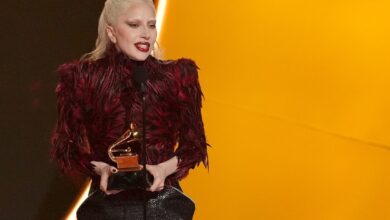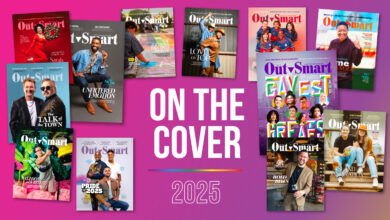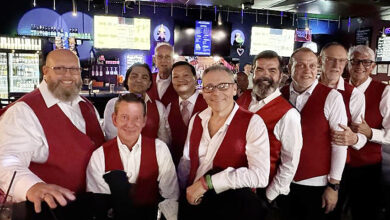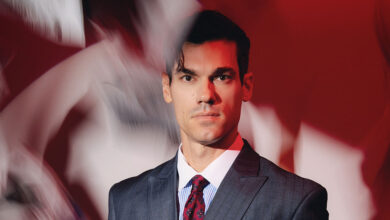Free to Be Queer
Singer/songwriter Scott Free releases a new, style-hopping CD.
By Gregg Shapiro
They Call Me Mr. Free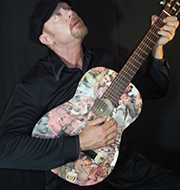
Gregg Shapiro: If a song could be called Scott Free’s trademark song, “The Muffin Song (No One’s Ever Been in Love With Me),” would be it. What is the genesis of the song?
Scott Free: This was a few years back now, but I was lying in bed with a friend, post-sex, when the idea for the song popped into my head. He hates the fact that he has to take credit for inspiring that song! The lyrics are an exaggeration, but after 15 years without dating anyone, it felt like “no one’s ever been in love with me.”
The version of “The Muffin Song” on They Call Me Mr. Free rocks out, so to speak.
I always thought of it as a rocker. It’s just in the past few years with Homolatte and Queer Is Folk Fest as my main projects [the former is a weekly queer words-and-music event in Chicago; the latter is an annual Chicago music festival, next scheduled for May 21], I’ve been playing almost exclusively solo acoustic. I also decided that I wanted other musicians involved on this song, so I got Robert Urban to play the guitars, and Anthony Maulella was brought in for the drums. We recorded it at Robert’s studio, Urban Productions, in New York City. It came out wonderful, and makes for quite a different start of a Scott Free CD.
There are a few hip-hop tracks on They Call Me Mr. Free. The first one is “Another Day of the Cruelty” which is a brilliant lifting of Dr. Dre’s Eminem-style production.
I like to brag about being the first white rapper. I had a rap video on BET back in the ’80s. It was right before the Beastie Boys came out. But the song was so bad that I never let anyone hear it now. After that song, I stayed away from the genre for many years. It was actually Eminem that made me see how rap could be used outside the clichés that were the industry-driven rap before him. As much as I resent Eminem for using gay-bashing as a career builder, I respect his talent. “Another Day of the Cruelty” is really a musical response to Eminem, hence it was done in Dre’s style. It’s about antigay violence in schools, a subject that Eminem hadn’t really thought about while he was busy making millions by advocating violence against us.
“Never Again and Again” is an anthemic antiwar song. Did you ever imagine that you would be writing an antiwar song in your lifetime?
Actually, one of the first songs I ever wrote was called “War Fever.” It was on a cassette-only release—very rare! Even stranger is that I wrote a house track called “Never Again and Again” back from that period, but it was a completely different song, having nothing to do with war. But when our charming president decided to invade the country of his choice, I was reminded of that phrase again, and so I rewrote “Never Again and Again.” I have to say that every few years I write a song that I am truly proud of, and this is one of those songs.
A number of songs on the disc directly address the current music scene. “The Emperor’s New Song,” for instance, lashes out at the music industry.
I’ve often contemplated the fact that I have pursued an art form that, in my opinion, has been more corrupted by industry takeover than any other art form. I think it’s sad to see how the industry pumps out garbage and then attempts to hold the public’s attention through gossip in the tabloids. I know I’m older, but I miss the days when artists were revered for the craft and musicianship they put into their work. The Beatles really started the concept in the ’60s, and it continued with people like Joni Mitchell, but now the industry has no interest in that kind of artistic pursuit. “The Emperor’s New Song” is a fitting comparison to the old fairy tale, because bad music is pushed on the public and no one stands up to say how awful it really is.
“Gospel Singers” is a collaboration with Steve Jay. Tell me something about your collaborative process, and about the song itself.
I don’t know if it could be called a collaborative process. I think Steve was surprised to hear he was a co-writer! He’s a playwright, and we were hanging out together at this bookstore. I was working on lyrics, he was working on a play. I was trying to complete this song I had about antigay bigotry in the black Baptist churches. He grew up in that kind of environment, so I kept bugging him for phrases he heard in his church when he was growing up. We didn’t realize it at the time, but most of the song turned out to be his recollections. He gave the song exactly the flavor I wanted—the fact that these preachers are about theater, not about Christianity, and, really, theater in its lowest form. The phrases they use are often sexually graphic. They’re really just trying to be stand-up comedians. Also, back in the good old days when they had adult bookstores in downtown Chicago, I heard many stories about preachers being seen going into those places. I just had to include that in the song. Also, the line about “riding with the KKK” is an actual quote from a preacher on the south side of Chicago giving us his charming views on gay marriage. It made national headlines.
“Disco Divas” and “When Queer Rockers Become Stars” are another kind of comment on queer culture and community.
“When Queers Become Rock Stars” is unfortunately the underlying antigay history of rock and roll. So many performers from the beginning of rock and roll have either pretended to be gay early on only to turn “straight” as their record sales increased or have made a career hiding the fact that they are gay. And what’s shocking is the level that it still goes on today. So many musicians are still in the closet. So I thought it was a subject that needed a good Scott Free song.
“Disco Divas” is one of those songs I have a tendency to write that get me into trouble. It’s kind of my style to antagonize, but really it’s not antidisco. I love disco as a musical form. The premise of the song is that Pride fests around the country feature straight artists on their music stages, which I think is a sad commentary on our community. We have so many talented performers in our community. Shouldn’t Pride fest be the day to support our own? Since I wrote “Disco Divas,” I’ve really thought about what brought us to where we are today. When gay men made dance music their own in the 1970s, it was very openly gay. The Village People and Sylvester were completely out. Then I’m not sure what happened, whether it was AIDS or just record-industry greed, but gay disco went into the closet, so to speak. Records like “It’s Raining Men” became big, and although it has a hidden gay agenda, it is for all consideration simply a song about a straight woman’s love for men. The producers of the › record didn’t have the guts to have a man sing it, which is what they meant by the song. So, as I state in “Disco Divas,” why does our music have to be in the closet when we’re not?
“Ronald Reagan’s Funeral” and “Fair Trade” are the kinds of political statements we’ve come to expect from you.
I was living in New York City in those dark days of the beginning of AIDS, and I remember distinctly the anger I felt towards Ronald Reagan, the man. I remembered the government’s immediate reaction to what was called Legionnaire’s Disease only a few years before AIDS hit. Millions of dollars were rushed to find the cause of that single strange occurrence in a hotel where 30 men died. Yet, when reports of homosexuals dying of some new strange disease started appearing, Reagan’s response was absolute silence. The death toll kept getting bigger—first it was 15, then 30, then 100. We all know the end result: the most horrifying plague in modern history. The week after Reagan died, the television and newspapers were filled with all the wonderful things he had done, with no mention of AIDS. In the gay press, thankfully, there was a backlash against this glaring omission. Most of the lyrics of my song were inspired by those press accounts.
“Fair Trade” is my contribution to the awareness that needs to be made about torture inflicted by the Chicago Police Department on crime suspects in the 1980s. It’s also about the absurdity of having the death penalty in a legal system where corruption can infiltrate so easily. The death penalty is used as a bargaining tool, even as a way to threaten innocent people into confessing to crimes they didn’t commit. I wrote it as a rap, because I consider rap today to be the equivalent of ’60s folk music. It’s very Dylan in its approach.
“Who Do I Thank?” is sort of the antithesis of “The Muffin Song.” Basically, Scott Free has found love.
If there was any concept to this mishmash song collection, it was that I started the CD with “The Muffin Song” and ended it with “Who Do I Thank?” If “The Muffin Song” was inspired by 15 years of being single, “Who Do I Thank?” is a response to those 15 lonely years being over. There’s no doubt that meeting my partner Gene has been the best thing that’s ever happened to me. I’d seen him in the community years before I had the opportunity to meet him, but even back then I knew he was the one. He told me he had seen me years before he met me also. Love is a many splendored thing, isn’t it?
Gregg Shapiro is a past recipient of the annual OutMusic award that recognizes involvement by non-musicians in furthering the work of GLBT performers.


